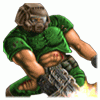11 minutes ago, Noddy92 said:
So what Richards is proposing is something similar to some sort of phase combat, if I'm understanding this correctly. The more research I do, the more I lean towards the classic action points (JA2, the original XCOM), but I'm really skeptical about this sort of hybrid system. This is one of the things I couldn't get used to RTwP (Real-time with pause).
I don't think that is what I am suggesting, but I might not be understanding by what you mean by phases combat...
What I am suggesting is this:
At the start of a turn each character has two actions... one little, one large. This is easily indicated with a bar (as Thiago suggests). Let's say there are two small actions, move or take cover, and one large action, shoot. There is also a massive action which takes the entire turn, like take an aimed shot, or get very deeply into cover. The character can use his entire turn to complete this longer action.
Each character has three choices, they can perform one little and one large action, in whatever order they want (they can move then shoot, or shoot then move, or take cover then shoot, or shoot then take cover), they can perform two little actions (run twice, or run then take cover, or take cover then run) or they can perform one massive action (take an aimed shot, or get into deep cover).
You can use different colours to show the available actions and the cost of each action.
Once each character has used his actions his turn is over. I'm not sure where the phasic bit is coming from...
This is just a suggestion. You should, of course, choose the mechanic that suits you best. I mostly wanted to highlight that each option has different effects regarding expedience and complication, and was suggesting something in the middle.
12 minutes ago, Noddy92 said:
Anyway, back to my first question, which system will be more player friendly AP or one-two, are players getting lazy to calculate action points, can people enjoy my game besides the complex AP system?
It's not about laziness, per se. It's about feel. If someone thinks the game is going to require calculation, or quick options, they'll approach it differently. You need to decide where you want the focus to be.







